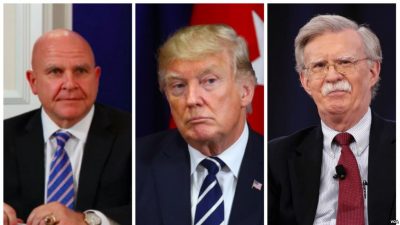Pre-emptive Triggers: John Bolton Joins Trump

It has given those in a permanent state of jitters greater reason to jump off the cliff to a certain fate, but John Bolton’s elevation to President Donald J. Trump’s inner circle is predictable and, patterns of employment permitting, brief. It is easy to see each and every appointment of the current president as manically dangerous, shading those of his predecessors. Move over national security advisor H. R. McMaster and welcome Mr. Pre-emption.
The predictions of imminent cataclysm at this latest turn have a certain screeching quality, feeding the endless exhaust fan of Trumpographic terrors. There is a fear that war with Iran might well be possible. This would be tenable, presuming that Trump had taken leave of his remaining senses, and Bolton had received a surge of blood lust. The doomsday cartel is being kept busy.
With all of this, it is easy to forget the last president who found Bolton’s services useful, one who with singular influence plunged the Middle East into multigenerational chaos and sanguinary mayhem. As a right-wing shock pundit he was appointed by President George W. Bush, that other monstrosity of the White House, to destabilise the United Nations. (To be more exact, destabilise the US relationship with that oft confused, disparate entity.)
The danger Bolton poses is dependent on the access, regularity and seeming cogency of his advice to the president. As he explained on Fox News, he is an open book, smudged, as it were, by a certain enthusiasm for war.
“During my career, I have written I don’t know how many articles and op-eds and opinion pieces. I have given – I can’t count the number of speeches, I’ve had countless interviews… They’re all out there on the public record. I’ve never been shy about what my views are.”
He is the creature of pre-emption, the proponent of violent redress regarding international disputes. Evidence of misconduct matters less than the prompt elimination of threats, a strike on Washington’s enemies before they assume any significant influence or form. He has, for instance, put forth boisterous, if clinical positions on striking North Korea (amusingly enough, he dresses this as legal), and Iran.
“It is perfectly legitimate,” he wrote last month in The Wall Street Journal, “for the United States to respond to the current ‘necessity’ posed by North Korea’s nuclear weapons by striking first.”
He admitted to various “gaps in US intelligence in North Korea,” but rather than seeing this as a note to be cautious, Bolton suggests the opposite. Washington “should not wait until the very last minute. That would risk striking after the North has deliverable nuclear weapons, a much more dangerous situation.”
His writings have a cool surgical air to them, absent casualties and consequences. The dead, in these instances, do not speak, let alone matter. There are only necessary attacks, imbalances of power that need redressing, and military set pieces. Iran, for instance, requires eradication, a homicidal view that would deserve in at least some small way, the tag of genocide. “[E]nd the Islamic Republic before its 40th anniversary,” he cheered in the pages of the WJS.
In 2005, he outlined approaches to crippling the Islamic Republic’s potential nuclear capacity, a somewhat less evolved idea of extinguishing the state. “Rendering inoperable the Natanz and Fordow uranium enrichment installations and the Arak heavy-water production facility and reactor would be priorities. So, too, would be the little noticed but critical uranium-conversion facility in Isfahan.” Attack Iran, break “key links in the nuclear-fuel cycle” and retard the program by three to five years. Naturally bring Israel on board to do the thorough job.
His positions have always assumed pre-emption. Threats loom in a permanent hot house of problems for US security. In 2002, during his time as Undersecretary of State for Arms Control and International Security, Bolton pressed his staff to draw up a document claiming that Cuba had an active biological weapons program and was in the business of transferring that technology to outlaw states.
On May 6, 2002, he described these heralded findings at the Heritage Foundation, prompting something of a storm:
“The United States believes that Cuba has at least a limited offensive biological warfare research and development effort. Cuba has provided dual-use biotechnology to other rogue states. We are concerned that such technology could support BW programs in those states.”
His superiors were left reeling with qualifications. “We did not say,” claimed a more cautious Secretary of State Colin Powell, “that [Cuba] actually had such weapons, but it has the capacity and the capability to conduct such research.”
So do most states, for that matter, but such a distinction has never troubled Bolton.
When confronted with demurring views on Cuba’s capabilities, Bolton intimidated the analysts, who grittily held out. As David Ignatius explained,
“Bolton wanted to sound the alarm about Cuba, regardless of what the [National Intelligence Estimate] said.”
Such conduct led to an initial blocking of his appointment as ambassador to the UN.
Critics will be wishing some for some act of cannibalisation within the Trump administration. The vital concern here is whether Bolton’s inability to accept evidence of actual threats coalesces with the president’s fantasies. But reduced to a personal dimension (the moustache Trump so detests), Bolton’s days are already numbered.
*
Dr. Binoy Kampmark was a Commonwealth Scholar at Selwyn College, Cambridge. He lectures at RMIT University, Melbourne. Dr. Kampmark is a frequent contributor to Global Research. Email: [email protected]

